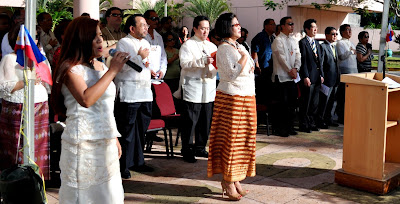Mensahi Ginen i Gehilo' #20: Independence Daze
It is intriguing the way that so many people assume something to be impossible and frightening in a particularly local or familiar context, but then completely miss the way that they accept such things in other contexts without even a hint of fear or apprehension. In Guam, a colony of the US for more than a century, and a colony of Spain for several centuries prior to that, this is frustratingly true and real in terms of the people of the island, both indigenous and non-indigenous, living in terror of Guam becoming independent. For other nations and other locations, independence is something to celebrate, a key moment in terms of a nation's development or evolution, something to look back on pride, even if your country has serious problems past or present. But it is intriguing how for example, Filipinos, Chinese or Koreans and others on Guam can celebrate the nationhood and the independence of their own nations, whether it be from colonialism, from imperialism or from their own social unrest, but in terms of Guam, they see the island achieving independence as being terrifying and unrealistic. It is also bewildering the way Chamorros and people from the US on Guam make the same contradictory assumptions about Guam, while enthusiastically celebrating the independence, both contemporary and historical, of the US. It is so fascinating to perceive all the various ways in which this resistance is articulated and how people can still somehow make these arguments in one hand, while waving a flag of an independent country in the other.
While in the current moment this can cause frustration, in the long term it can be useful. During FESTPAC last year, four panel discussions were held at the University of Guam, three focusing on each possible future political status for Guam, and the final featuring a representative of each at the same time. During the night focusing on independence as an option for Guam's future, the consulate for the Philippines on Guam made statements which gave some hope in terms of helping to overcome this unhelpful compartmentalization of conceptualizations of independence. He noted that on Guam, many Filipinos who had made the island their home seemed to be against Chamorro self-determination and their taking the lead in decolonization. He said that much of this could be explained due to their own lack of knowledge or understanding of their home country's fight for independence and decolonization. They were too Americanized and therefore cut off from the possibilities in the world. If they learned more about how their ancestors had fought for their own independence and have struggled since with problems from within and without, they would not feel compelled to deprive Chamorros of such a chance, but rather feel happy to support them and cheer them on as they take this step.
Olaha mohon na siña ta kombense siha put este. Mas ma'ok este na kinalamten anggen chinechinennek mo'na ni' otro na taotao lokkue', ti hita ha'.
While in the current moment this can cause frustration, in the long term it can be useful. During FESTPAC last year, four panel discussions were held at the University of Guam, three focusing on each possible future political status for Guam, and the final featuring a representative of each at the same time. During the night focusing on independence as an option for Guam's future, the consulate for the Philippines on Guam made statements which gave some hope in terms of helping to overcome this unhelpful compartmentalization of conceptualizations of independence. He noted that on Guam, many Filipinos who had made the island their home seemed to be against Chamorro self-determination and their taking the lead in decolonization. He said that much of this could be explained due to their own lack of knowledge or understanding of their home country's fight for independence and decolonization. They were too Americanized and therefore cut off from the possibilities in the world. If they learned more about how their ancestors had fought for their own independence and have struggled since with problems from within and without, they would not feel compelled to deprive Chamorros of such a chance, but rather feel happy to support them and cheer them on as they take this step.
Olaha mohon na siña ta kombense siha put este. Mas ma'ok este na kinalamten anggen chinechinennek mo'na ni' otro na taotao lokkue', ti hita ha'.




Comments